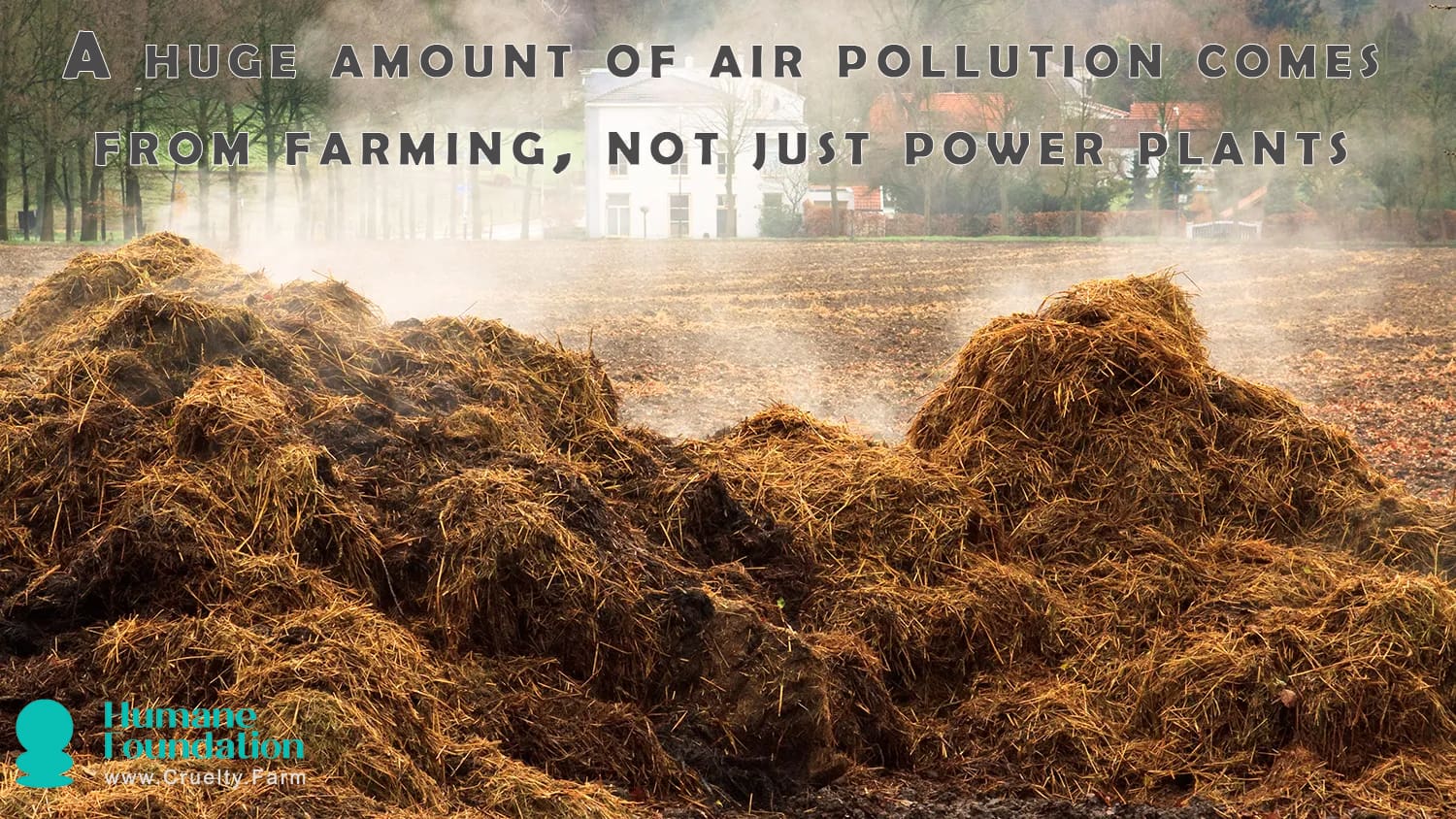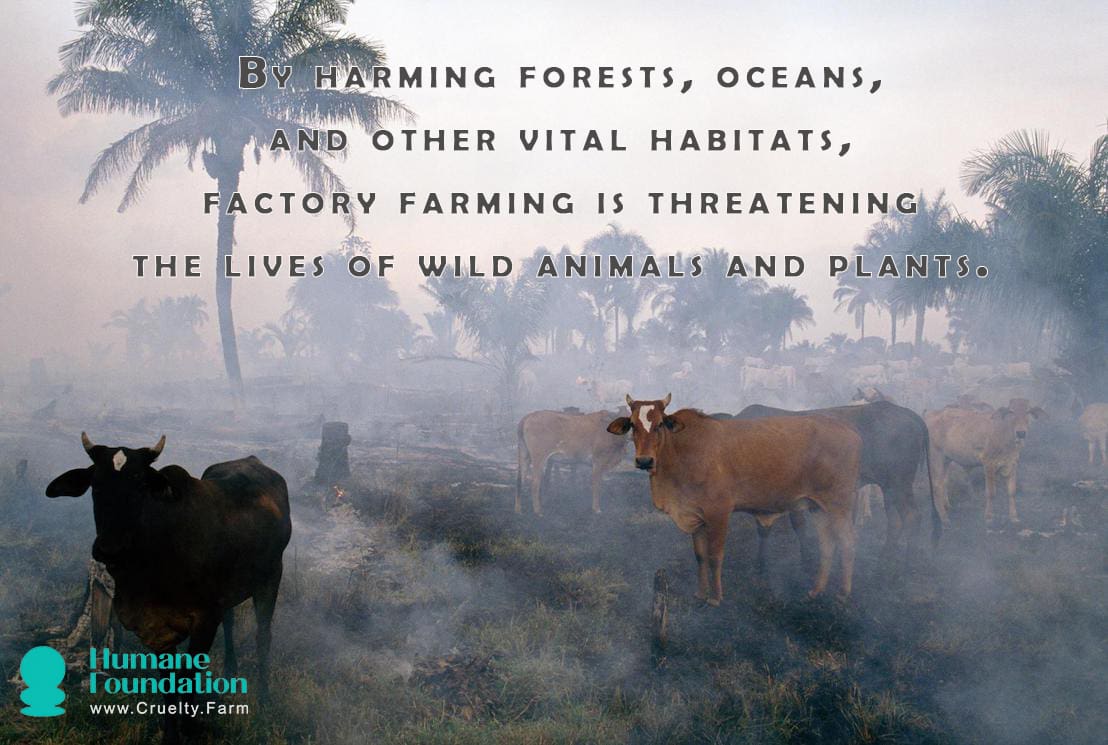የኢንዱስትሪ ግብርና በመባልም የሚታወቅ የፋብሪካ እርሻ በዓለም ዙሪያ በሚገኙ በርካታ ሀገሮች ውስጥ የምግብ ምርት ዋነኛው የምግብ ምርት ዋነኛው ዘዴ ሆኗል. ይህ ስርዓት ስጋ, የወተት, የወተት እና እንቁላልን ለሰው ልጆች ፍጆታ ለማምጣት በተቆጠሩ ቦታዎች ውስጥ ብዙ ቁጥሮችን ማሳደግን ያካትታል. ለሸማቾች ውጤታማነት እና ዝቅተኛ ወጪዎችን ቢመጣ, የዚህ ልምምድ የአካባቢ ውጤቶች አስፈላጊ እና ችላ ሊባሉ አይችሉም. ከጭንቀት እና ከውሃ ልማት እና የብዝሀ ሕይወት ማጣት, የፋብሪካ እርሻዎች, የፋብሪካ እርሻዎች በአከባቢው ላይ ትልቅ ተጽዕኖ ያሳድራሉ. በዚህ ጽሑፍ ውስጥ የአካባቢያዊ ውርደት ምን ያህል አስተዋጽኦ እንደሚያበረክት እና ይህንን እትም ለፕላኔታችን ጤና እና ዘላቂነት ሲባል ይህንን እትም ለማስተካከል አስፈላጊ የሆነው ለምን እንደሆነ እንመረምራለን. የፋብሪካ እርሻዎች አካባቢውን የሚጎዱትን የተለያዩ መንገዶች በመመርመር, የምግብ ማበረታቻ እና ፍጆታ የበለጠ ዘላቂ የምግብ ማምረት እና ፍጆታ የማድረግ አጣዳፊነትን መረዳት እንጀምራለን. ስለ ፋብሪካ እርሻዎች አሉታዊ ውጤቶች ግንዛቤ ማሳደግ እና በምግብ ምርት እና በአከባቢው መካከል የበለጠ ዘላቂ ግንኙነትን የሚያበረታቱ መፍትሄዎችን ለመተግበር አስፈላጊ ነው.
ከእንስሳት ቆሻሻ ግዙፍ ብክለት
የእንስሳት እርሻ አካባቢያዊ የአካባቢ መዘግየት አስፈላጊ እና ችላ ሊባል አይችልም. ከነዚህ ጉዳዮች መካከል አንዱ በእንስሳት ቆሻሻ የተከሰተ ግዙፍ ብክለት ነው. በፋብሪካ እርሻዎች የተሠራ የሀዳን መጠን የሚያንጸባርቅ ነው, አብዛኛውን ጊዜ በአቅራቢያው ባለው የመሬት እና የውሃ መንገዶች አቅም ለማካሄድ ወይም ለማሰራጨት አቅምን የሚያመጣ ነው. ይህ ቆሻሻ ከፍተኛ የናይትሮጂን, ፎስፈረስ, ፎስፈረስ, እና ወደ መሬት ውሃ ውስጥ ሊበክሉ እና በአቅራቢያው ያሉ ወንዞችን እና ጅረቶችን እንዲገቡ የሚችሉ ሌሎች ጎጂ ንጥረ ነገሮችን ይ contains ል. ከመጠን በላይ የምግብ ፈጣኑ ወደ አልጋው አበባዎች, በውሃ አካላት ውስጥ የኦክስጂን መጠን እና የውሃ ውስጥ ሥነ-ምህዳሮችን በመጉዳት ወደ አልጋው አበባዎች ይመራዋል. በተጨማሪም የአሞኒያ ቆሻሻ ከእንስሳት ቆሻሻ ሌሎች ጋዞች መለቀቅ ለአየር ብክለት, የአየር ጥራት እና ሰብዓዊ ጤና በአካባቢው ማህበረሰብ ውስጥ ተጽዕኖ ያሳድራል. ከእንስሳት ቆሻሻው የብክለት ምልከታ እና የእንስሳት ቆሻሻ ይህንን ግፊት የአካባቢ ችግርን ለመፍታት አስቸኳይ እርምጃን ይፈልጋል.

ከልክ ያለፈ የውሃ አጠቃቀም እና ብክለት
ውሃ ውድ ሀብት ሲሆን ከፋብሪካ እርሻዎች ጋር ከመጠን በላይ አጠቃቀም እና ብክለት ለአካባቢያችን አስቸጋሪ የሆኑ ተፈታታኝ ሁኔታዎችን ያስከትላል. የእንስሳት እርሻ ተፈጥሮአዊ ተፈጥሮ የተለያዩ ሰብሎችን ማጽዳት, የመገልገያዎችን ማፅዳት እና የእንስሳትን የመጠጥ ውሃ ጨምሮ የተለያዩ ዓላማዎችን ይፈልጋል. ይህ የውሃ ከፍተኛ ፍላጎት በአካባቢው የውሃ ምንጮች ላይ በተለይም የውሃ እጥረት ቀድሞውኑ በሚጋጠማቸው አካባቢዎች. በተጨማሪም በእንስሳ ምርት ውስጥ ኬሚካሎችን, አንቲባዮቲኮችን እና ሆርሞኖችን የያዘ ከፋብሪካ እርሻዎች ሩጫዎች, በአቅራቢያው የሚበዛባቸው የውሃ አካላት ሊበከል ይችላል. የውሃው ብክለት የአካባቢያዊ ሥነ-ምህዳሮችን ብቻ አይደለም, ነገር ግን እነዚህ ብክለቶች የመጠጥ ውሃ አቅርቦታችንን ማስገባት ስለሚችሉ እንዲሁ ለሰው ጤንነት ጭምር ደግሞ አደጋዎችን ያስከትላል. ከልክ በላይ የውሃ አጠቃቀምን እና ብክለት በፋብሪካ እርሻ አሰራሮች ውስጥ ያለውን ጉዳይ በመግደል የውሃ ሀብታችንን ለመጠበቅ እና ዘላቂ የወደፊት ሕይወት ማረጋገጥ ወሳኝ ነው.
ለሰብል ምርት የደን መጨፍጨፍ
የመመገብ የሰብል ምርታማነት የተስፋፋው የደን ጭፍጨፋ የግብፅ እርሻዎች ለአካባቢ ልማት አስተዋፅኦ የሚያደርጓቸውን ገጽታዎች በተመለከተ ሌላ ነው. የእንስሳት ምርቶች ፍላጎቶች እንደሚጨምር, እንደ አኩሪ አተር እና በቆሎ ያሉ ሰብሎች ብዙውን ጊዜ እነዚህን ብቃቶች ለማሟላት ብዙ ጊዜ የሚበቅሉ ሰብሎችን የመመገብ ፍላጎቶች ናቸው. ለእነዚህ ሰብሎች መሬትን ለማፅዳት, ዋጋ ያለው የደኖች ብዛት ያላቸው ደኖች ይደነቃሉ, ዋጋ ያለው ደኖች እና የብዙ ሥነ-ምህዳሮችን እና ብዝሃ ሕይወት እንዳያጡ ይመራሉ. ይህ የደን ጭፍጨፍ ተፈጥሮአዊ መኖሪያዎችን የሚያደናቅፍ ቢሆንም, ዛፎች የካርቦን ዳይኦክሳይድ ከከባቢ አየር ውስጥ የመጡ ወሳኝ ሚና እንደሚጫወቱ እንዲሁ ለአየር ንብረት ለውጥም እንዲሁ ለአየር ንብረት ለውጥ አስተዋጽኦ ያደርጋል. በተጨማሪም ደኖች መወገድ የአፈር መሸርሸር, የውሃ ጥራት ሊያስከትል ይችላል, እና በኑሮአቸው ውስጥ በእነዚህ ደኖች ላይ የሚተማመኑ የአገሬው ተወላጅ ማህበረሰቦችን ያስከትላል. በደን ጭፍጨፋ ላይ የማይተማመኑ የሰብክ ምርትን ለመመገብ የሰብክ ምርትን ለመመገብ የሚያስችሏቸውን የሰብአዊ ምርት ማማከር አስፈላጊ ነው.

የግሪንሃውስ ጋዝ ልቀቶች ስካይ-ከፍተኛ
የፋብሪካ እርሻዎች የአካባቢ ተጽዕኖ ድንገተኛ ተጽዕኖ ያሳድራል, ከድግግሞሽ ማነስ ባሻገር ያሳልፋል, በሀገር ውስጥ ጋዝ ልቀቶች ወደ ሰማይ-ከፍተኛ ደረጃዎች. በእነዚህ እርሻ ውስጥ ያለው ጥልቅ የእንስሳት ምርት ከፍተኛ መጠን ያለው ሚቴን እና ናይትረስ ኦክሳይድ, ሁለት ኃይሎች የግሪን ሃውስ ጋዞችን ያስለቅቃል. ሚቴን የሚመረተው በከብት እርባታ ውስጥ, በተለይም ከብቶች እና በጎች ባሉበት ወቅት, በተለይም ናይትደር ኦክሳይድ ከእንስሳት ቆሻሻ እና ከናይትሮጂን-ተኮር ማዳበሪያዎች ከመጠን በላይ ተጠቀሙ. እነዚህ ጋዞች ለአለም ሙቀት መጨመር እና የአየር ንብረት ለውጥ አስተዋጽኦ በማበርከት በከባቢ አየር ውስጥ ሙቀትን ያጠምዳሉ. ከፋብሪካ እርሻዎች የመጡ የግሪንሃውስ ጋዝ ልቀቶች ታላቅነት ዘላቂ የመርከብ ልምድን አተገባበር እና እያሽቆለቆለ ያለውን የአካባቢ ጥበቃን ለመዋጋት በእንስሳት እርሻ ላይ መተማመንን አስፈላጊነት አስፈላጊነት ነው.
የአየር እና የውሃ ጥራት ተጎድቷል
የፋብሪካ እርሻዎች ጎጂ የአካባቢ ተጽዕኖዎችም እንዲሁ በአከባቢው የተበላሸ የአየር እና የውሃ ጥራት በአከባቢው አካባቢዎች ይካሄዳል. የተከማቹ የእንስሳት መገባቶች ሥራዎች አሞኒያ, ሃይድሮጂን ሰልፈርት እና ክምችት የተካተተ ጉዳዮችን ጨምሮ ወደ ከባቢ አየር ውስጥ ወደ ከባቢ አየር ውስጥ ከፍተኛ የብክለት ብክለቶች ያወጣል. እነዚህ ብክለቶች ወደ ጎጂ አየር ጥራት ሊመሩ, በአቅራቢያው ለሚኖሩት ሰዎች የመተንፈሻ አካላት ችግሮች ያስከትላሉ. በተጨማሪም, በፋብሪካ እርሻ ልምዶች ውስጥ የኬሚካዊ ማዳበሪያዎችን እና ፀረ-ተባይ መድሃኒቶችን ከመጠን በላይ መጠቀም ወደ ሽርሽር ብክለት ያስከትላል. ይህ የተበከለ Revoff የውሃ አካላትን በማበርከት እና በቀላሉ የሚገኙትን ሥነ-ምህዳሮች ለማስፈራራት የውሃ አካላት ያጠፋቸዋል. በፋብሪካ እርሻዎች ምክንያት የአየር እና የውሃ ጥራት ውርደት በእነዚህ ሥራዎች ምክንያት የተፈጠሩ ሥነ-ምህዳራዊ ጉዳትን ለማቃለል ትዕግስት እና ዘላቂ አማራጮችን የሚያስፈልጋቸውን አጣዳፊነት ያጎላል.
የአፈር መሸርሸር እና የመበላሸት ተስፋ
የፋብሪካ እርሻ አጥፊ መዘዝ ከአየር ብክለት እና የውሃ ብክለት, የአፈር መሸርሸር እና መበላሸት ሌላ ትልቅ አሳሳቢ ጉዳይ ነው. በፋብሪካ እርሻዎች ውስጥ የተሠሩ ጥልቅ የእርሻ ድርጊቶች ብዙውን ጊዜ መጫኛ እና ሰራሽ ማዳበሪያዎችን እና ፀረ-ተባዮችን ከባድ አጠቃቀም ያካትታሉ. እነዚህ ልምዶች የተፈጥሮ ንጥረ ነገሮችን አፈር ያወዛወዋል እናም ለጤነኛ የአፈር አወቃቀር አስፈላጊ የሆኑ ጥቃቅን ጥቃቅን ተሕዋስያን ሚዛን ይረብሻሉ. በዚህ ምክንያት ለምብሪት ኮረብታው ለአፈር መሸርሸር ደካማ ይሆናል. እንደ የሰብል ማሽከርከር እና የመከርከምበር የመሬት ሽፋን, ለፋብሪካ እርሻ የሚጠቀሙበት መሬት በፍጥነት ሊወስድ ይችላል, ይህም በፍጥነት እርሻን ለመቀነስ እና ዋጋ ያለው የሱፍ ማጣት ያስከትላል.
ጎጂ ኬሚካሎች ወደ አካባቢያዊ
ከአፈር መሸርሸር የአፈር መሸርሸር እና መበላሸት ከሚያስከትለው ጉዳት እና ውዝግብ, የፋብሪካ እርሻም እንዲሁ የጎጂ ኬሚካሎችን በአከባቢው ውስጥ እንዲደርሱ አስተዋጽኦ ያደርጋል. በነዚህ ክዋኔዎች ውስጥ ያለው ሰፋ ያለ አጠቃቀም በአቅራቢያው ያሉ የውሃ ምንጮች ብክለቶችን, ወንዞችን, ጥቃቅን የውሃ ማጠራቀሚያዎችን ጨምሮ በአቅራቢያው ያሉ የውሃ ምንጮች ብክለት ሊያስከትሉ ይችላሉ. የሰብል እድገትን እና ተባዮችን ለመቆጣጠር የታቀዱ እነዚህ ኬሚካሎች በአከባቢው አፈር ውስጥ እንዲገቡ እና በመጨረሻም በመሮጥ ወይም በመጥፎነት ውስጥ ወደ የውሃ ጎዳናዎች ውስጥ ወደ የውሃ ማጫዎቻዎች መሄድ ይችላሉ. አንዴ እነዚህ የመርከቧ ንጥረ ነገሮች አንድ ጊዜ ወደ የውሃ ስነ-ምህዳሮች እና በእነሱ ላይ በሚተማመኑበት ተህዋሲያን ሊያስከትሉ ይችላሉ. በተጨማሪም, ከፋብሪካ እርሻዎች የመጡ ጎጂ ኬሚካሎች የልጅነት ጉዳት ሊያደርስባቸው የረጅም ጊዜ ጉዳቶችን ያስከትላል, ይህም አሰልጣኝነት ብቻ ሳይሆን የሰውን ጤና ደግሞ ደግሞ የእነዚህ ብራቶች ወደ ምግብ ሰንሰለት ሊገቡ ይችላሉ.
በብዝሃ ሕይወት ላይ አሳዛኝ ተፅእኖ
የፋብሪካ እርሻዎች እንዲሁ በብዝሃ ሕይወት ውስጥ ከባድ ስጋት በመግለጽ በአስተማማኝ ሥነ-ምህዳሮች ሚዛን ላይ ከባድ አደጋ ላይ በመውሰድ ላይ መጥፎ ተጽዕኖ ያሳድራሉ. በእነዚህ ክዋኔዎች ውስጥ ያሉ የእንስሳት እርባታ እና ከመጠን በላይ መጨናነቅ ያስከትላል, ብዙውን ጊዜ በጥሩ ሁኔታ የሚተዳደር ነው. ከፍተኛ የናይትሮጂን, ፎስፈረስ, እና ሌሎች ብክለቶች የያዙ ሲሆን ወደ ተንቀሳቃሽነት የሚወስደውን ወደ ተንቀሳቃሽነት የሚወስደውን ወደ አዲሱ የውሃ አካላት ሊገቡ ይችላሉ. ይህ ከልክ ያለፈ የምግብ መጫዎቻ የኦክስጂን መጠን የሚያሟሉ የአሊክስጂን መጠንን የሚያስተካክለው የአሊክስ ቧንቧዎች ፍጥረታትን የሚያስተካክል እና የተፈጥሮ ምግብ ሰንሰለቶችን የሚያስተጓጉቱ አልጋው አበባዎችን ያስከትላል. በተጨማሪም, ለፋብሪካ እርሻዎች መሬትን ማጽዳት ለጉድ አገር ብድሮች ማፍቀር, ቤተኛ ዝርያዎችን ማቃለል እና አጠቃላይ የብዝሀ ሕይወትን መቀነስ. የተለያዩ የዕፅዋት ማጣት እና የእንስሳት ዝርያዎች ማጣት, ሥነ-ምህዳራዊ ሂደቶችን, የአበባ ዱቄቶችን እና በመጨረሻም, የስነ-ምህዳሮችን መረጋጋት መረጋጋት ያስከትላል. በታላቅ እና ኃላፊነት በሚሰማው የግብርና ልምዶች በብዝሀ ሕይወት ላይ የሚደርሰውን የጭካኔ መዘዞችን መፍታት አስፈላጊ ነው.
በማጠቃለያው በአከባቢው ላይ የፋብሪካ እርሻ ላይ የሚያሳድረው ተጽዕኖ ችላ ሊባል አይችልም. እነዚህ ክወናዎች ከውሃ ብክለሽ የመጡ, እነዚህ ክዋኔዎች በፕላኔታችን ጤና ላይ ጉልህ እና ዘላቂ ውጤት አላቸው. ይበልጥ ዘላቂ እና የአካባቢ ጥበቃ ስርዓት ለመፍጠር እነዚህን ጉዳዮች መቀበል እና መፍታት ለእኛ አስፈላጊ ነው. በፋብሪካ እርሻ አቋማጮዎች ጎጂ ልምዶች ላይ እርምጃ በመውሰድ ለእራሳችን እና የወደፊት ትውልዶች ወደ ጤናማ ፕላኔቶች እንስራ.

በየጥ
የፋብሪካ እርሻዎች የውሃ ብክለትን እንዴት አስተዋጽኦ የሚያደርጉ እና የረጅም ጊዜ የአካባቢ ተፅእኖዎች ምንድ ናቸው?
የፋብሪካ እርሻዎች የእንስሳት ብክለት በመለቀቅ እና ኬሚካዊ ማዳበሪያዎችን በመጠቀም የውሃ ብክለት አስተዋጽኦ ያደርጋሉ. በምግብ እና በባክቴሪያ ውስጥ ያሉ ቆሻሻዎች በአቅራቢያው ባለው የውሃ ምንጮች እና በአባላቲታዊ ሥነ-ምህዳሮች ከመጠን በላይ አልጋ ዕድገት እና የኦክስጂን ማሻሻያ በመፍጠር በአቅራቢያ ያሉ የውሃ ምንጮች በአቅራቢያ ያሉ የውሃ ምንጮች ውስጥ ሊበክሉ ይችላሉ. ይህ የዓሳ እና ሌሎች የውሃ ነጋዴዎች ሞት ያስከትላል. በተጨማሪም የኬሚካል ማዳበሪያዎች መጠቀም ለሰው ልጆች ፍጆታ ደህንነቱ የተጠበቀ እንዲሆን በማድረግ የከርሰ ምድር ውሃ ብክለት ያስከትላል. የረጅም ጊዜ የአካባቢ ተፅእኖዎች የውሃ ጥራት ማጣት, የስነ-ምህዳራዊ ስርዓት ማበላሸት እና የመረበሽ ቀሪ ሂሳብን ማጎልመሻን ያካትታሉ, በመጨረሻም የውሃ ጤና እና የአከባቢው አጠቃላይ ዘላቂነትም ተጽዕኖ ያሳድራሉ.
ከፋብሪካ እርሻ ጋር የተዛመዱ ዋና ግሪንሃውስ ጋዝ ልቀቶች ምንድናቸው እና ለአየር ንብረት ለውጥ እንዴት አስተዋጽኦ ያደርጋሉ?
ከፋብሪካ እርሻ ጋር የተቆራኘው ዋና የግሪንሃውስ ጋዝ ልቀቶች ሚሴ እና ናይትረስ ኦክሳይድ ናቸው. ሚቴን በ ENGIC ውስጥ መፍሰስ ሂደት ወቅት ከብቶች, በተለይም ከብቶች የሚወጣው ከብቶች, በተለይም ከብቶች ይለቀቃል. ናይትረስ ኦክሳይድ ከድግ አያያዝ ይለቀቃል እና ሠራሽ ማዳበሪያዎችን መጠቀም. እነዚህ ጋዞች የአየር ንብረት ለውጥን በከባቢ አየር ውስጥ በማዞር እና የግሪን ሃውስ ተጽዕኖ ያሳድራሉ. ሚቴን ጠንካራ የግሪን ሃውስ ጋዝ ነው, ከካርቦን ዳይኦክሳይድ የበለጠ ውጤታማ ነው, እና ናይትረስ ኦክሳይድ ከፍተኛ የአለም ሙቀት መጨመር አቅም አለው. በፋብሪካ እርሻዎች ውስጥ ያለው ትልቁን ማበረታቻ እና ማጎሪያ ለአየር ንብረት ለውጥ ዋና አስተዋጽኦ ማበርከት ከፍተኛ ልቀቶችን አስተዋጽኦ ያደርጋል.
በፋብሪካ እርሻ ውስጥ አንቲባዮቲኮች ከመጠን በላይ አንቲባዮቲኮች ከመጠን በላይ መጠቀም ለአንቲባዮቲክ-ተከላካይ ባክቴሪያዎች እድገት አስተዋጽኦ ያበረክታል?
በፋብሪካ እርሻ ውስጥ አንቲባዮቲኮች ከመጠን በላይ መጠቀምን አንቲባዮቲክ-ተከላካይ ባክቴሪያዎችን የመረጠው ተጽዕኖ በሚባለው ሂደት ላይ አስተዋጽኦ ያደርጋል. አንቲባዮቲኮች በእነዚህ ቅንብሮች ውስጥ በእንስሳት በሚተዳደሩበት ጊዜ ለአደንዛዥ ዕፅ የሚቋቋም ባክቴሪያዎች ብቻ የሚፈጥሩበት አካባቢን ይፈጥራል. እነዚህ የመቋቋም ችሎታ ያላቸው ባክቴሪያዎች በተበከለው ስጋን በመጠቀም ወይም በቀጥታ ከእርሻ ሠራተኞች ጋር በቀጥታ በመገናኘት ወደ ሰዎች ሊሰራጩ ይችላሉ. በፋብሪካ እርሻ ውስጥ አንቲባዮቲኮች በበሽታው ቁጥጥር ውስጥ አንቲባዮቲክ ተከላካይ ባክቴሪያዎችን እድገት ያፋጥነዋል, ይህም ለሕዝብ ጤና ጥበቃ በማድረግ.
በብዝሃ ሕይወት እና ሥነ-ምህዳራዊ ጤና ላይ የፋብሪካ እርሻ አሉታዊ ውጤቶች ምንድ ናቸው?
የፋብሪካ እርሻ በብዝሃ ሕይወት እና ሥነ-ምህዳራዊ ጤና ላይ ብዙ አሉታዊ ተፅእኖ አለው. ሰፊ የእንስሳት እርሻ ለእንስሳት እርባታ ልማት ምርት ሲጸዱ ወደ የደን ጭፍጨፋ ይመራዋል. ይህ መኖሪያ ቤቶችን ያጠፋል እና ሥነ-ምህዳሮችን ያሻሽላል. በተጨማሪም, የፋብሪካ እርሻ ከፍተኛ የአረንጓዴው የጋዝ ልቀትን ያስገኛል, ለአየር ንብረት ለውጥ እና የብዝሀ ሕይወትን ለማጉላት የበለጠ ጉዳት ለማድረስ ከፍተኛ መጠን ያለው የግሪንሃውስ ጋዝ ልቀትን ያስገኛል. በእንስሳ እርሻ ውስጥ አንቲባዮቲኮች እና ፀረ-ተባዮች ከመጠን በላይ መጠቀምን እንዲሁ የውሃ ውስጥ ህይወትን በመፍጠር እና ለሰው ልጆች ጤና አደጋ ላይ የሚጥሉ የውሃ መንገዶችን ይበዛሉ. በተጨማሪም አንድ ነጠላ ሰብል ብቻ የሚበቅልበት የጎብኝዎች ልምምድ, የተለያዩ የዕፅዋት እና የእንስሳ ዝርያዎችን በማስወገድ የብዝሃ ሕይወትን ይቀንሳል. በአጠቃላይ, የፋብሪካ እርሻ በብዝሃ ሕይወት እና ሥነ-ምህዳራዊ ጤና ላይ ከፍተኛ ጉዳት ያስከትላል.
የፋብሪካ እርሻዎች ለአፈር ውርደት ምን እያደረጉ እና የግብርና ዘላቂነት የሚያስከትሉት መዘዝ ምንድነው?
የፋብሪካ እርሻዎች በብዙ መንገዶች ለአፈር መበላሸት አስተዋጽኦ ያደርጋሉ. የኬሚካዊ ማዳበሪያዎችን እና ፀረ-ተባይ መድሃኒቶችን ከመጠን በላይ መጠቀም ወደ የአፈር ብክለታ ወደ ንጥረ ነገር ይመራል. ማሽኖች እና ከባድ የእንስሳት እርባታ ከመጠን በላይ የመሽተሻ ውጤት በአፈር ማጠናቀር እና በአፈር መሸርሸር ውስጥ. የግብርና ዘላቂነት የሚያስከትለው መዘዝ ከባድ ነው. የተበላሸ አፈር የውሃ እና ንጥረ ነገሮችን የመያዝ ችሎታን ያጣል, የሰብል ምርታማነትን መቀነስ. የአፈር መሸርሸር አፈር እንደገና ለማደስ ዓመታት የሚወስድበትን የ SOSOPALE ወደ ማጣት ይመራዋል. የተበከለ አፈር ሰብሎች ጥራት ላይ ተጽዕኖ ያሳድራል እና የውሃ ምንጮችን ሊበክል ይችላል. በመጨረሻም, የፋብሪካ እርሻዎች የምግብ ምርትን ዘላቂነት እና የስነ-ምህዳራዊ ጤናን ለማጣራት የፋብሪካ ልምዶች የግብርና ተግባራትን ዘላቂነት ያዳክማሉ.















































